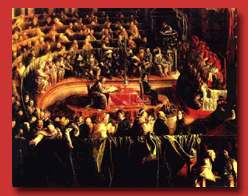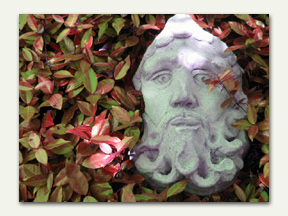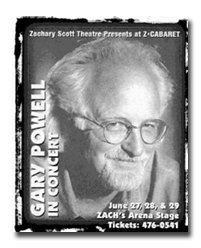by Gary Powell
This painting depicting Galileo’s trial in front of the Catholic church tribunal hung in my brother’s, Joe Powell, house for years. While researching the seminal events where individuals stood up against the institution, this great painting came to mind. When I found the image, I asked my brother, “Is this the painting you had in your house?” He answered, “Yes it is, how about those BOYS IN RED?” The song title was born in that instant and I knew I had another historical piece to interpret musically where power tries to subdue truth.
Perhaps people who focus on their own ethical standards don’t have time to tell the rest of us what’s right.
– Joe M. Powell, Director
The Rice University Building Institute

by Gary Powell
This painting depicting Galileo’s trial in front of the Catholic church tribunal hung in my brother’s, Joe Powell, house for years. While researching the seminal events where individuals stood up against the institution, this great painting came to mind. When I found the image, I asked my brother, “Is this the painting you had in your house?” He answered, “Yes it is, how about those BOYS IN RED?” The song title was born in that instant and I knew I had another historical piece to interpret musically where power tries to subdue truth.
Perhaps people who focus on their own ethical standards don’t have time to tell the rest of us what’s right.
– Joe M. Powell, Director
The Rice University Building Institute
 Continue reading “
Continue reading “
Galileo Goes on Trial 1633
“The Boys in Red” from Aristotle’s Prayer“
by Gary Powell.
 ONE SIMPLE QUESTION to a trusted mentor of all things requiring a deep understanding is what started this performance idea. His name is Ralph Person who is 73 years old with a Doctorate of Theology (DTheol) from the University of Basel in Switzerland. His lifelong relationship with church, philisophy and political history is rich.
ONE SIMPLE QUESTION to a trusted mentor of all things requiring a deep understanding is what started this performance idea. His name is Ralph Person who is 73 years old with a Doctorate of Theology (DTheol) from the University of Basel in Switzerland. His lifelong relationship with church, philisophy and political history is rich.
So, I asked him this question at dinner with no provocation: “What happened in this country (USA) in 1776 that caused such an explosion of human potential and production in every aspect of how humans live, work and prosper together?” Without blinking he said, “You’d have to go back to Aristotle to answer that question!” Ralph expanded the answer by saying, “Aristotle believed that man was uniquely ‘the rational creature’ and that reason was man’s sole source of conceptual knowledge.” Ralph then made a quick leap through the middle ages showing that Thomas Aquinas had rediscovered Aristotle and taught that reason and faith need not conflict. This led to the Renaissance and the Enlightenment.
REASON IS MAN’S BASIC TOOL FOR UNDERSTANDING HIS WORLD AND SURVIVING AND LIVING EFFECTIVELY!
Ralph then went on to explain how Aristotle (384-322 B.C.) was the emancipator of reason. For the first time in history, Aristotle had suggested faith and reason be held apart and that reason is man’s basic tool for understanding his world and surviving and living effectively! Probably not a fabulously popular idea in 350 B.C.!
Ralph then made this remark which astounded me: “Aristotle’s idea, for the most part, didn’t surface again until …….. well, Thomas Jefferson in 1776!” And…there was the answer to my question.
This conversation happened in October, 2004. I was so inspired by the prospect of gaining insight into my own choices and inevitabilities that I thought I could have a two-hour show up by Christmas, 2005. The inevitabilities have stepped forward, but the passion has not flagged. Thanks to Ralph with his wisdom and knowledge, I will add one more voice to the “Choir of Emancipation” in which Ralph has been singing for decades before me.
by Gary Powell.
 ONE SIMPLE QUESTION to a trusted mentor of all things requiring a deep understanding is what started this performance idea. His name is Ralph Person who is 73 years old with a Doctorate of Theology (DTheol) from the University of Basel in Switzerland. His lifelong relationship with church, philisophy and political history is rich.
ONE SIMPLE QUESTION to a trusted mentor of all things requiring a deep understanding is what started this performance idea. His name is Ralph Person who is 73 years old with a Doctorate of Theology (DTheol) from the University of Basel in Switzerland. His lifelong relationship with church, philisophy and political history is rich.
So, I asked him this question at dinner with no provocation: “What happened in this country (USA) in 1776 that caused such an explosion of human potential and production in every aspect of how humans live, work and prosper together?” Without blinking he said, “You’d have to go back to Aristotle to answer that question!” Ralph expanded the answer by saying, “Aristotle believed that man was uniquely ‘the rational creature’ and that reason was man’s sole source of conceptual knowledge.” Ralph then made a quick leap through the middle ages showing that Thomas Aquinas had rediscovered Aristotle and taught that reason and faith need not conflict. This led to the Renaissance and the Enlightenment.
REASON IS MAN’S BASIC TOOL FOR UNDERSTANDING HIS WORLD AND SURVIVING AND LIVING EFFECTIVELY!
Ralph then went on to explain how Aristotle (384-322 B.C.) was the emancipator of reason. For the first time in history, Aristotle had suggested faith and reason be held apart and that reason is man’s basic tool for understanding his world and surviving and living effectively! Probably not a fabulously popular idea in 350 B.C.!
Ralph then made this remark which astounded me: “Aristotle’s idea, for the most part, didn’t surface again until …….. well, Thomas Jefferson in 1776!” And…there was the answer to my question.
This conversation happened in October, 2004. I was so inspired by the prospect of gaining insight into my own choices and inevitabilities that I thought I could have a two-hour show up by Christmas, 2005. The inevitabilities have stepped forward, but the passion has not flagged. Thanks to Ralph with his wisdom and knowledge, I will add one more voice to the “Choir of Emancipation” in which Ralph has been singing for decades before me.

by Gary Powell
This was my first one-man show titled after my book by the same name. The book was written in the early 1980’s as the musings of a young man struggling with learning how to manage a young career burdened with heavy expectations, talent and self-doubt. No doubt this work would have been a blog had they existed in 1982. I never liked having to run the gauntlet of record companies, so I was determined to write a book and publish it without asking any authorities’ permission. “Maybe I’m It, Maybe I’m Not” is that effort. Fifteen years later, I adapted the work into a solo musical performance at Zachary Scott Theatre Center in Austin, Texas and performed it in the Spring of 1997.

by Gary Powell
This was my first one-man show titled after my book by the same name. The book was written in the early 1980’s as the musings of a young man struggling with learning how to manage a young career burdened with heavy expectations, talent and self-doubt. No doubt this work would have been a blog had they existed in 1982. I never liked having to run the gauntlet of record companies, so I was determined to write a book and publish it without asking any authorities’ permission. “Maybe I’m It, Maybe I’m Not” is that effort. Fifteen years later, I adapted the work into a solo musical performance at Zachary Scott Theatre Center in Austin, Texas and performed it in the Spring of 1997.
This is composer, Gary Powell’s 2nd one-man show under development right now. Gary Powell’s productions have sold over 30 million albums in 47 countries. He has taught at the University of Texas at Austin and continues to lecture and coach. Watch how the development of this performance art is conceived and produced. The first show presented in 1997 is now entitled “Maybe I’m It, Maybe I’m Not”.


